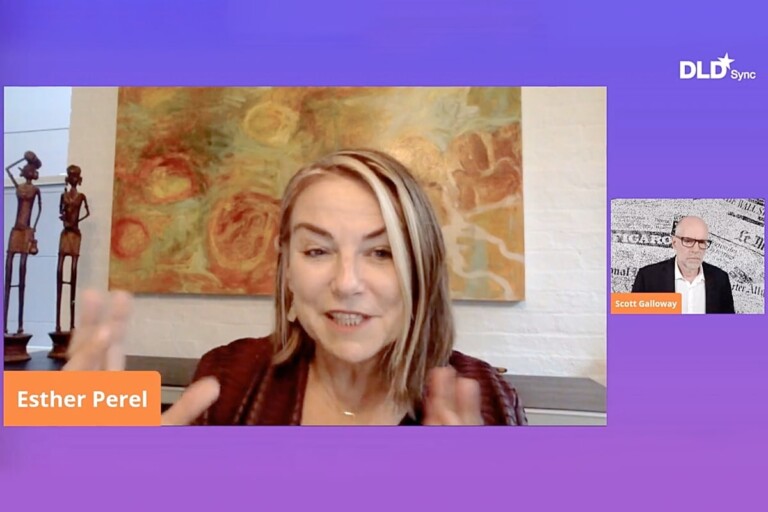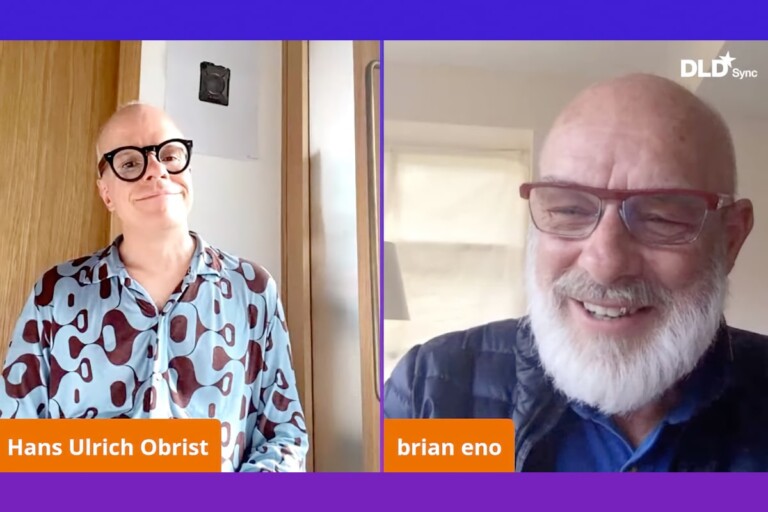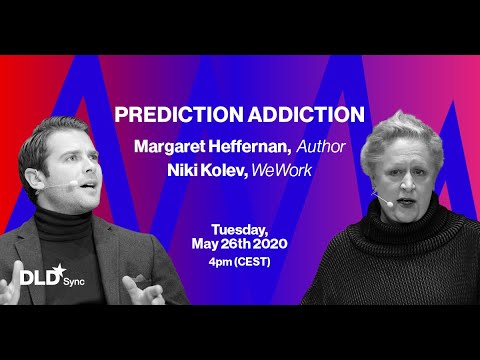
Make Uncertainty Your Friend!
It’s easy to forget in times of turmoil, but life has always been unpredictable, full of events that no one could have foreseen, rich with moments of surprise. The coronavirus pandemic is merely amplifying this key fact of life. “Uncertainty is always with us”, bestselling author Margaret Heffernan observed in a DLD Sync session with Niki Kolev, WeWork’s Managing Director for Northern and Central Europe.
How could we forget? Because technology has tricked us into believing that we’re able to escape this fact of life, Heffernan suggested. “In the last 10 to 20 years we’ve been very seduced by this idea that with enough data we can predict everything”, Heffernan said. “And when we can predict everything we can control everything.”
But that’s an illusion, she insisted. “Uncertainty is an absolutely defining quality in life, and we should stop fighting it and learn how to make it our friend.”
As a professor and business consultant, Heffernan gains many valuable insights into successfully managing moments of uncertainty. Highlights of her conversation with Niki Kolev follow below, along with a video of the full session.
Niki Kolev is Managing Director Northern & Central Europe at WeWork. He brings 13 years of entrepreneurial, management and investment experience. In 2014, Kolev co-founded Deloitte Digital Ventures and served on Deloitte’s Consulting Management Team (CMT) as Digital Transformation Lead from 2016-2019.
Dr. Margaret Heffernan is a former BBC producer, entrepreneur and author, most recently of Uncharted: How to map the future. She is Lead Faculty for the Forward Institute’s Responsible Leadership Programme and, through Merryck & Co., mentors CEOs and senior executives of major global organizations.
Discomfort Zones
Covid-19 has thrown much of the world into disarray, and understandably many business leaders are longing to return to a state of familiarity. “They just want to get back in their comfort zone, [and] on some level I can’t blame them”, Heffernan said. But if conditions change it’s better to adjust and change the recipe, she suggested. “Open up your refrigerator and say, ‘What have we got?’”
Organizations willing to adapt, matching their assets to a different set of circumstances, might even find the experience liberating. The U.K.’s National Health System was a good example, Heffernan said. “The crisis has made them more collaborative and more innovative under pressure than they’d ever been allowed to be in the past – and they love it!”
Similarly, business leaders should see the pandemic as an opportunity to accelerate transformation programs “that were supposed to take years and cost millions” and get them done in mere weeks, Heffernan recommended. “This is a phenomenal opportunity for companies – if they have the guts – to dig deep and say, ‘What have we got that really matters to the world today? Let’s focus on that!’”
Open Up!
Another reflex that top executives ought to resist, Heffernan said, is to bring the senior leadership together “in a big huddle” and to think: “Somehow, between us, we’re going to figure everything out.”
Instead, she advised, companies should open up to ideas from everyone in the team, no matter how junior or senior. “You have to ask people to tell you what you should be doing, and be prepared – with some humility – to listen to it”, Heffernan said. “You have to really reach out to everyone in the company and say, ‘OK, we’re in a different place now. Nobody is an expert in how to manage through a pandemic. So we need everybody’s ideas and everybody’s thoughts.’”
This should explicitly include women and minorities as well, Heffernan emphasized, “because they bring a very, very different lens to corporate cultures”. In the past, many companies may have thought, “Let women in – as long as they don’t change anything”, Heffernan said. Now, in times of disruption, the logic should be the exact opposite: “We have to let women in, and ethnic minorities in, because they’re tremendous drivers of change. Because they bring different perspectives and mindsets.”
Productive Breaks
That’s all good and well, some might reply. But how deeply do next-generation team members really want to be involved? “How hungry are young people today?”, Niki Kolev asked. Are they perhaps more concerned with finding the right work-life balance, rather than taking responsibility in running the business?
“They are very hungry”, Margaret Heffernan replied. “In all honesty, they know that the way that we have built – and generations before us built – the business environment has enormous problems.” As for finding the right balance between work hours and leisure time, “maybe they understand a lot about productivity that other people don’t.”
After all, studies have shown again and again that human productivity hits a ceiling at about 40 hours per week, she pointed out. And where do successful founders find their ideas? Typically not at their desks, but by being out and about, discovering things that could be improved.
“So this time away from the desk or the office is not necessarily time away from work”, Heffernan observed. “I think we need a much broader, imaginative concept of how ideas are born and where they come from.”
The coronavirus pandemic will undoubtedly change office life anyway, both speakers agreed. One immediate effect could be far less time spent in cars and trains, Kolev suggested. “Companies do realize that it is not the best use of your time to commute for hours a day”, he said. “So they start to create flexibility around hubs, around a town, around different offices.”
The Right Mix
When companies are opening up to fresh ideas by younger team members, they should also make sure to capitalize on the experience that senior employees bring to the table, Margaret Heffernan noted. “These kinds of pairings – especially between people who are not exactly the same – they can be tremendously productive”, she said, adding that debates and dissent are good, not something to avoid. “The best work is done by very rich, often very contentious collaboration.”
In general, criticism should be welcomed, and seen as a gift, Heffernan advised. “The critic is your friend and may save you from investing years in something that for all sorts of reasons wouldn’t work.”
But how to unite a diverse workforce that may not always agree on everything? Offer a goal that is important to everybody, Heffernan recommended. “What really aligns people is a big ambition that matters”, she explained. A common goal “becomes a kind of magnet that aligns people who may be very different in themselves – but really care about this vision”.
This insight was often underrated, she pointed out, because instead “we too often call it a purpose when what we really mean is 10 percent growth per year. Which is completely uninspiring.”
Just Be Quiet
Leaders are expected to show the way and offer answers – but creative leaders may want to take a different approach. For serendipity and inspiration, top executives should learn to hold back, Margaret Heffernan advised, and enter meetings with the firm intention to say nothing, unless absolutely necessary.
In this case, “you listen in a completely different way”, she explained, “and what you hear is much richer. Because you’re not looking for that moment where you just dive in and land your point.” The approach also challenges fellow executives to come up with their own solutions, which may be more inventive than what the boss had in mind.
“Just go in, promise you say nothing”, Heffernan recommended. “And after that, shut up. Because either you’ve hired great people – in which case, let them be great. Or you haven’t. In which case you have a different problem.”
In the Dark, And Loving It
The plan was: In September, Margaret Heffernan would tour the U.S. to present her newest book, Uncharted: How to Map the Future Together, to American readers (it was published in the U.K. in February). But now? Who knows. “I have no idea!”, she exclaimed. “Maybe I’ll be there, maybe I won’t.”
As you would expect from somebody teaching the virtues of uncertainty, these question marks hanging over her own future don’t seem to trouble Heffernan too much. “I’ll continue to work with entrepreneurs, and with really big corporations, and will try to get them to understand their value to each other”, she said. “And I’m going to start a new book.”
Where the narrative may take her – again, who knows? And that’s exactly as it should be. “The uncertainty is actually what makes it interesting, the uncertainty is what makes it worth doing”, Heffernan explained. She compared writing a book to starting a business. “You do some experiments, and they don’t quite work, and then you do some other experiments, and they work a little better” – until ultimately the project succeeds. Unless it fails. Either way, there will always be the benefit of learning and gaining experience.
“This book may turn out to be one of the ones that I fall in love with but never finish”, Heffernan said. “It may turn out to be the best book I’ve ever written. It may turn out to be something completely different because halfway through I change my mind. All I know is, I’ll be working on something. That’s my plan. A very detailed plan.”
And then she laughed. Uncertainty, it turns out, can be bliss, if you approach it with the right frame of mind.
Watch the Video
More DLD Sync

Covid-19: The Death of Eros?


